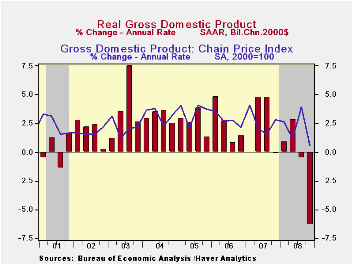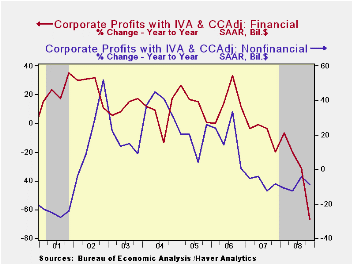 Global| Mar 26 2009
Global| Mar 26 2009U.S. 4Q GDP Decline Remains Sharpest Since Early 1980s As Profits Crater
by:Tom Moeller
|in:Economy in Brief
Summary
The U.S. Bureau of Economic Analysis indicated that its revised estimate of 4Q '08 was little changed. The 6.3% (AR) decline compared to the preliminary estimate of a 6.2% drop. Nevertheless, the decline was the steepest since 1982 [...]

 Real U.S. final sales to domestic purchasers contracted at a 5.8% annual rate and that was the worst decline since the 1980 recession when consumers pocketed their credit cards. Personal consumption expenditures fell an unrevised 4.3% (-1.5% y/y) as spending on motor vehicles declined at a huge 38.0% annual rate. Business fixed investment fell at a 21.7% rate (-5.2% y/y) and residential investment dropped at a 22.8% rate (-19.4% y/y).
Real U.S. final sales to domestic purchasers contracted at a 5.8% annual rate and that was the worst decline since the 1980 recession when consumers pocketed their credit cards. Personal consumption expenditures fell an unrevised 4.3% (-1.5% y/y) as spending on motor vehicles declined at a huge 38.0% annual rate. Business fixed investment fell at a 21.7% rate (-5.2% y/y) and residential investment dropped at a 22.8% rate (-19.4% y/y).
The government sector contributed marginally to GDP growth last quarter. Activity rose at a 1.3% annual rate (3.2% y/y) led by a 6.9% (8.2% y/y) rise in Federal spending.
The estimate of price inflation was unrevised. The 0.5% increase in the GDP chain price index remained greatly reduced from the 3.9% advance during 3Q. The PCE price index fell at a 4.9% annual rate as gasoline prices fell. The residential investment chain price index fell at a 9.4% annual rate while the business fixed investment price index rose 4.6%.
The U.S. National Income & Product Account data is available in Haver's USECON and the USNA databases.
Sources of the Great Moderation: shocks, friction, or monetary policy? from the Federal Reserve Bank of San Francisco is available here.
| Chained 2000$, % AR | 4Q '08 (Final) | 4Q '08 (Preliminary) | 4Q '08 (Advance) | 3Q '08 | 4Q Y/Y | 2008 | 2007 | 2006 |
|---|---|---|---|---|---|---|---|---|
| GDP | -6.3 | -6.2 | -3.8 | -0.5 | -0.8 | 1.1 | 2.0 | 2.8 |
| Inventory Effect | -0.1 | 0.2 | 1.3 | 0.8 | 0.1 | 0.1 | -0.4 | 0.0 |
| Final Sales | -6.2 | -6.4 | -5.1 | -1.3 | -0.7 | 1.4 | 2.4 | 2.8 |
| Foreign Trade Effect | -0.2 | -0.5 | 0.1 | 1.1 | 1.4 | 1.4 | 0.6 | 0.2 |
| Domestic Final Demand | -5.8 | -5.7 | -4.9 | -2.2 | -1.7 | -0.0 | 1.8 | 2.6 |
| Chained GDP Price Index | 0.5 | 0.5 | -0.1 | 3.9 | 2.0 | 2.2 | 2.7 | 3.2 |
Tom Moeller
AuthorMore in Author Profile »Prior to joining Haver Analytics in 2000, Mr. Moeller worked as the Economist at Chancellor Capital Management from 1985 to 1999. There, he developed comprehensive economic forecasts and interpreted economic data for equity and fixed income portfolio managers. Also at Chancellor, Mr. Moeller worked as an equity analyst and was responsible for researching and rating companies in the economically sensitive automobile and housing industries for investment in Chancellor’s equity portfolio. Prior to joining Chancellor, Mr. Moeller was an Economist at Citibank from 1979 to 1984. He also analyzed pricing behavior in the metals industry for the Council on Wage and Price Stability in Washington, D.C. In 1999, Mr. Moeller received the award for most accurate forecast from the Forecasters' Club of New York. From 1990 to 1992 he was President of the New York Association for Business Economists. Mr. Moeller earned an M.B.A. in Finance from Fordham University, where he graduated in 1987. He holds a Bachelor of Arts in Economics from George Washington University.
More Economy in Brief
 Global| Feb 05 2026
Global| Feb 05 2026Charts of the Week: Balanced Policy, Resilient Data and AI Narratives
by:Andrew Cates






